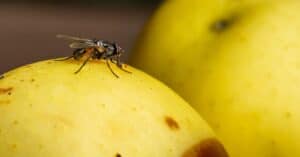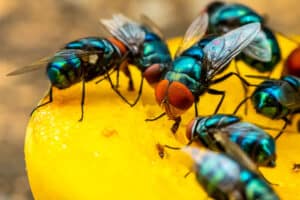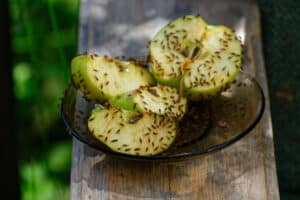Flies are some of the most common household insects in the world — and the most annoying. They invade your home and buzz around when you don’t want them to. They also have a habit of being attracted to food and landing on it the moment you leave it unattended. In fact, you’ve probably heard that they vomit or poop whenever they land, but is this really true? Read on to discover whether flies really throw up or poop when they land!
Do Flies Throw Up or Poop When They Land?
Yes, flies really do throw up or poop when they land, but it doesn’t happen every time.
It’s often assumed that flies throw up every time they land — especially when they land on food. However, this isn’t strictly true. Instead, flies only vomit when they have landed on something that they they want to eat and when it needs softening so that they can consume it.
Why Do Flies Vomit When They Land?
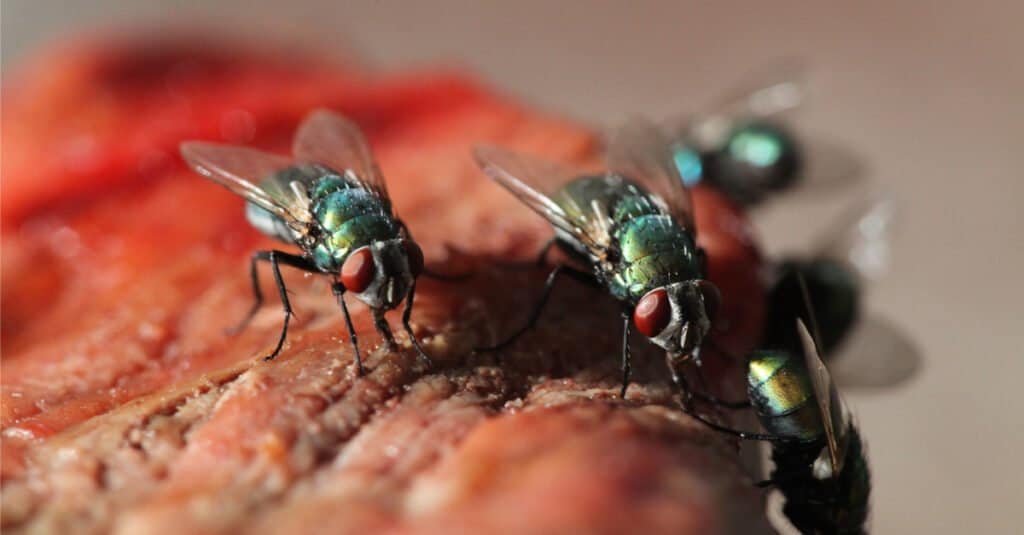
Flies throw up so that they can liquify food, allowing them to suck it up with their specialized mouthpart.
©iStock.com/reto_s
As we’ve just explained, flies only vomit when they have landed on something that they plan to consume. This is because flies don’t have teeth and they cannot chew their food. Instead, they have a long, specialized mouthpart which is called a proboscis. This is a long tube-like section which is used to suck food up with. However, for flies to suck up food with their proboscis the food needs to be soft enough for them to do so. This is where the vomiting comes in.
Flies use part of their mouthpart to pierce the food and insert their proboscis. Once the proboscis is inserted then they can begin to suck up the food with it. Sometimes the food is soft enough for them to suck it up straight away — such as decaying matter or feces. However, in other cases, the food is not soft enough so the flies have to turn it into a liquid themselves — by vomiting.
When flies vomit into their food what they are actually doing is releasing a saliva secretion which contains several different enzymes. These enzymes help to break down the food and turn it into something that is softer and much easier for the fly to ingest. Some species of flies will even use their proboscis to actually suck body fluids out of their prey which can consist of a range of other insects.
Why Do Flies Poop When They Land?
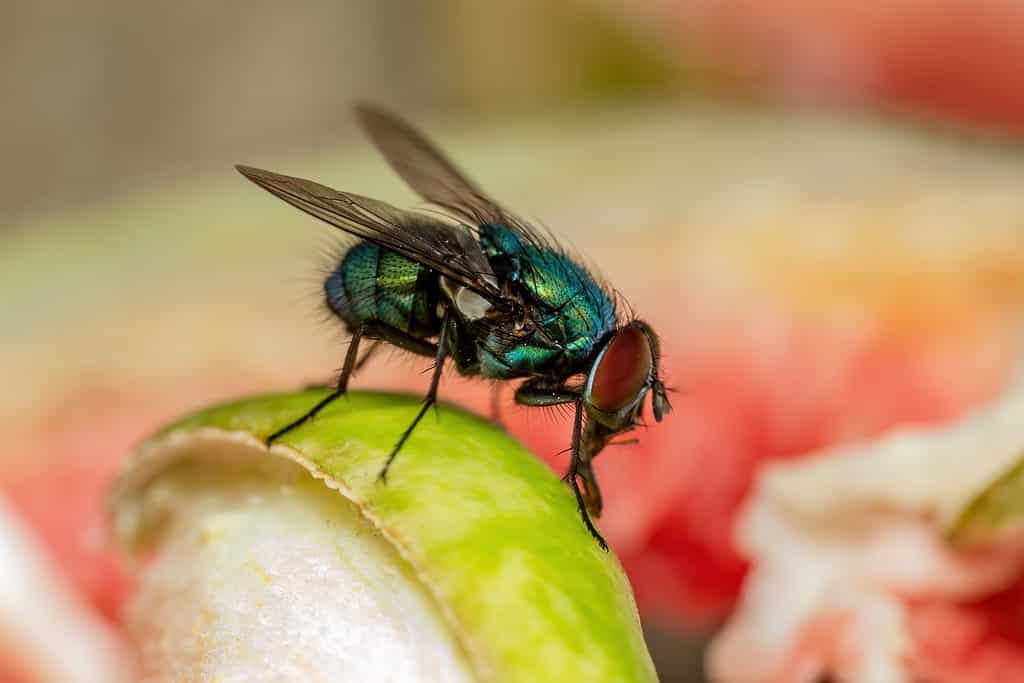
Flies poop a lot on surfaces because their have a fast metabolism.
©nechaevkon/Shutterstock.com
As well as vomiting on their food, flies also have a reputation for pooping when they land. Flies poop a lot and the reason for this is that they have a fast metabolism. In fact, they actually poop when they land much more often than they vomit. Flies will poop on any surface, including the food that they eat — meaning that the area where they land can contain both vomit and poop! As their diet typically consists of liquid food they are able to move it through their digestive system quickly. Therefore, they need to get rid of the waste product quickly too, even if it’s almost immediately after they have just eaten!
Can Flies Taste Using Their Feet?
Incredibly, flies don’t taste their food using only their mouthpart. Instead, they actually taste their food with their feet too! This is because their feet have chemoreceptors (taste receptors) on them. These chemoreceptors allow flies to literally taste their meal by walking all over it. Flies are able to detect chemicals using their feet and determine whether the area is best suited for feeding from or for laying their eggs on.
Do Flies Lay Eggs When They Land?
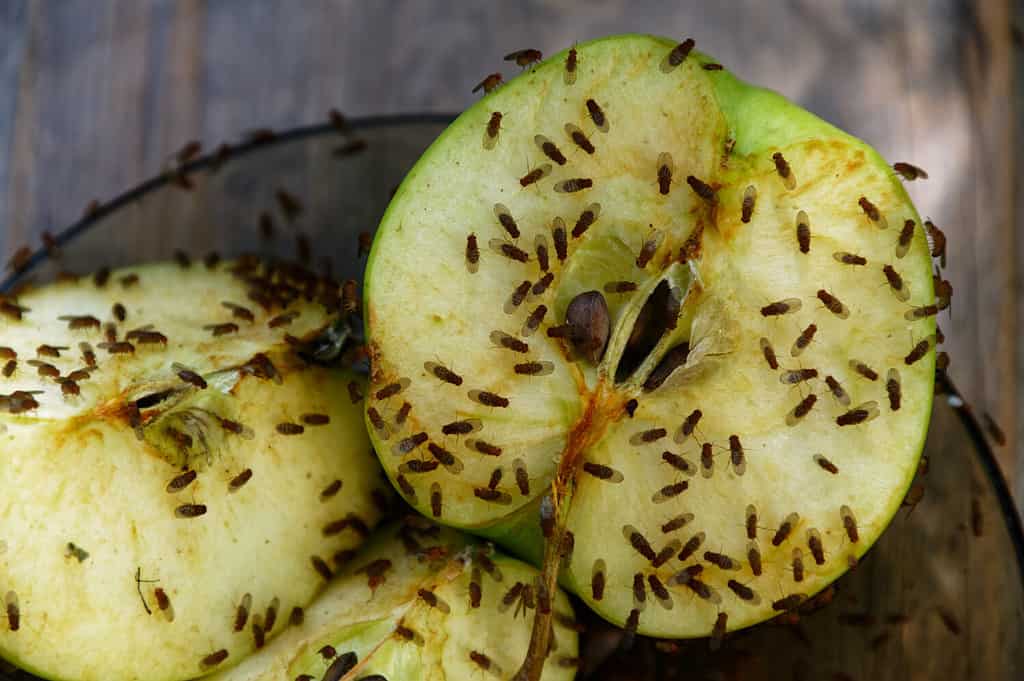
Flies will often lay their eggs on a suitable surface when they land — such as on decaying food.
©Anne Webber/Shutterstock.com
If you aren’t already grossed out at the thought of flies throwing up and pooping where they land, then you probably will be once you know that they can also lay eggs when they land — even on food. Once flies have determined whether the area is a suitable reproductive site — often by walking all over it — they will then deposit their eggs.
Female flies use a structure which is called an ovipositor to deposit their eggs onto the chosen surface. The ovipositor is another tubular structure, although this time located at the end of the abdomen. The fly can then lay their eggs which will then hatch within days so long as the environment is suitable. Depending on the species, the chosen location for the eggs can be around a drain, on food, in decomposing trash, and even in decaying organic matter.
The photo featured at the top of this post is © Abel Tumik/Shutterstock.com
Thank you for reading! Have some feedback for us? Contact the AZ Animals editorial team.



